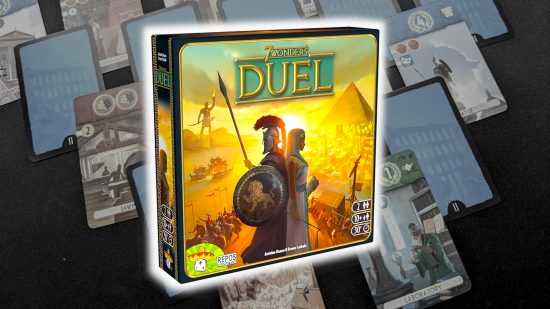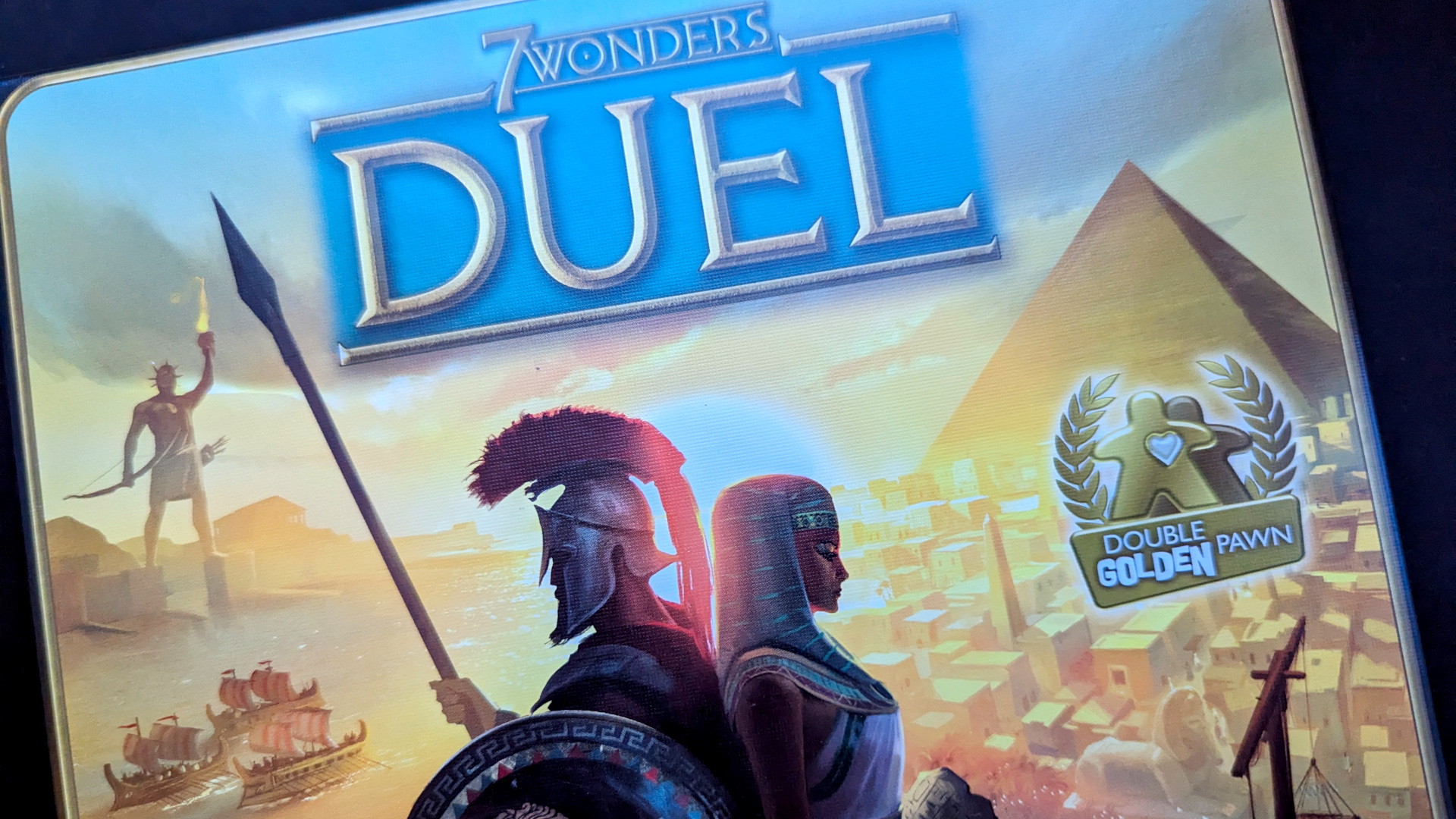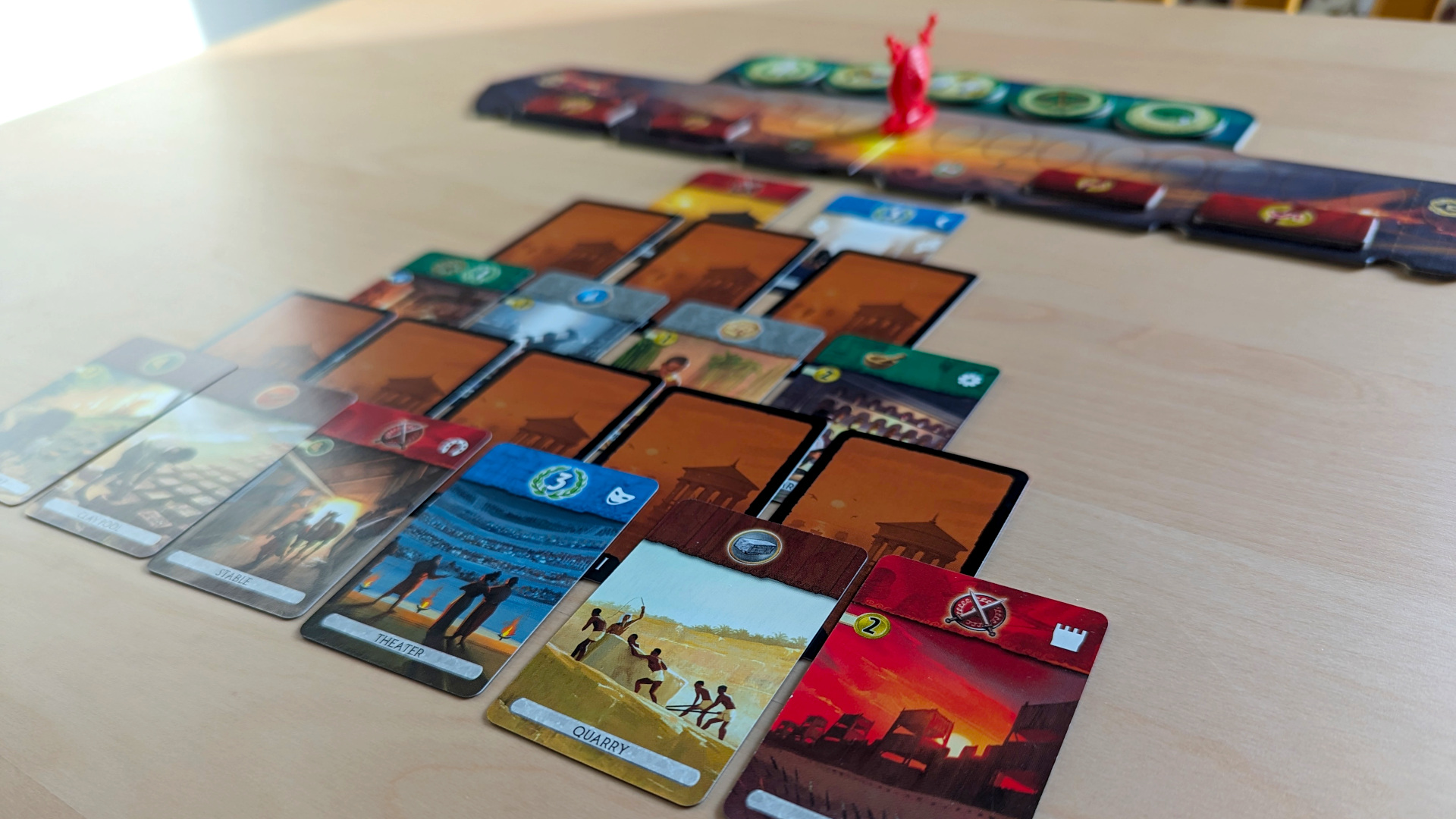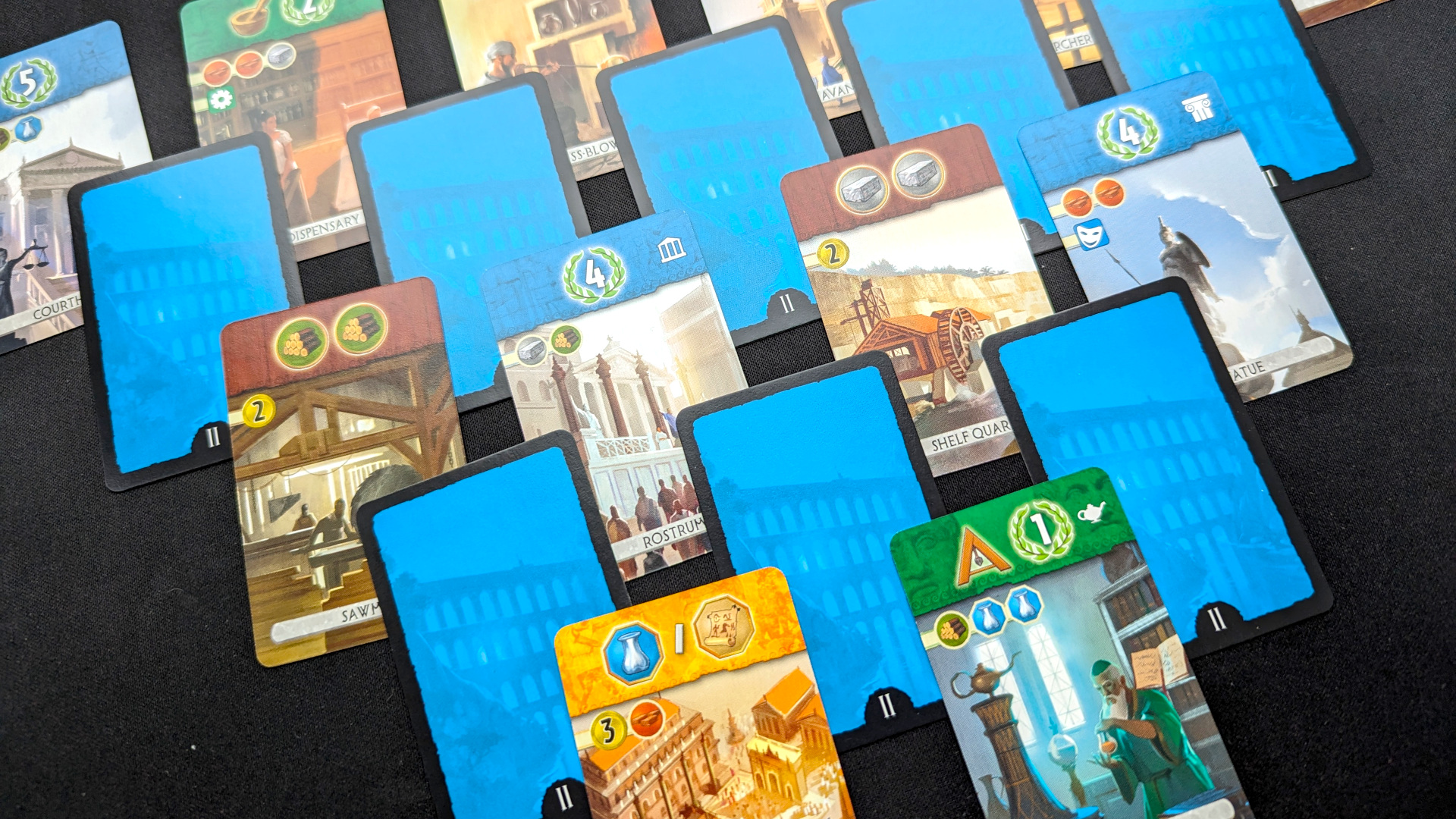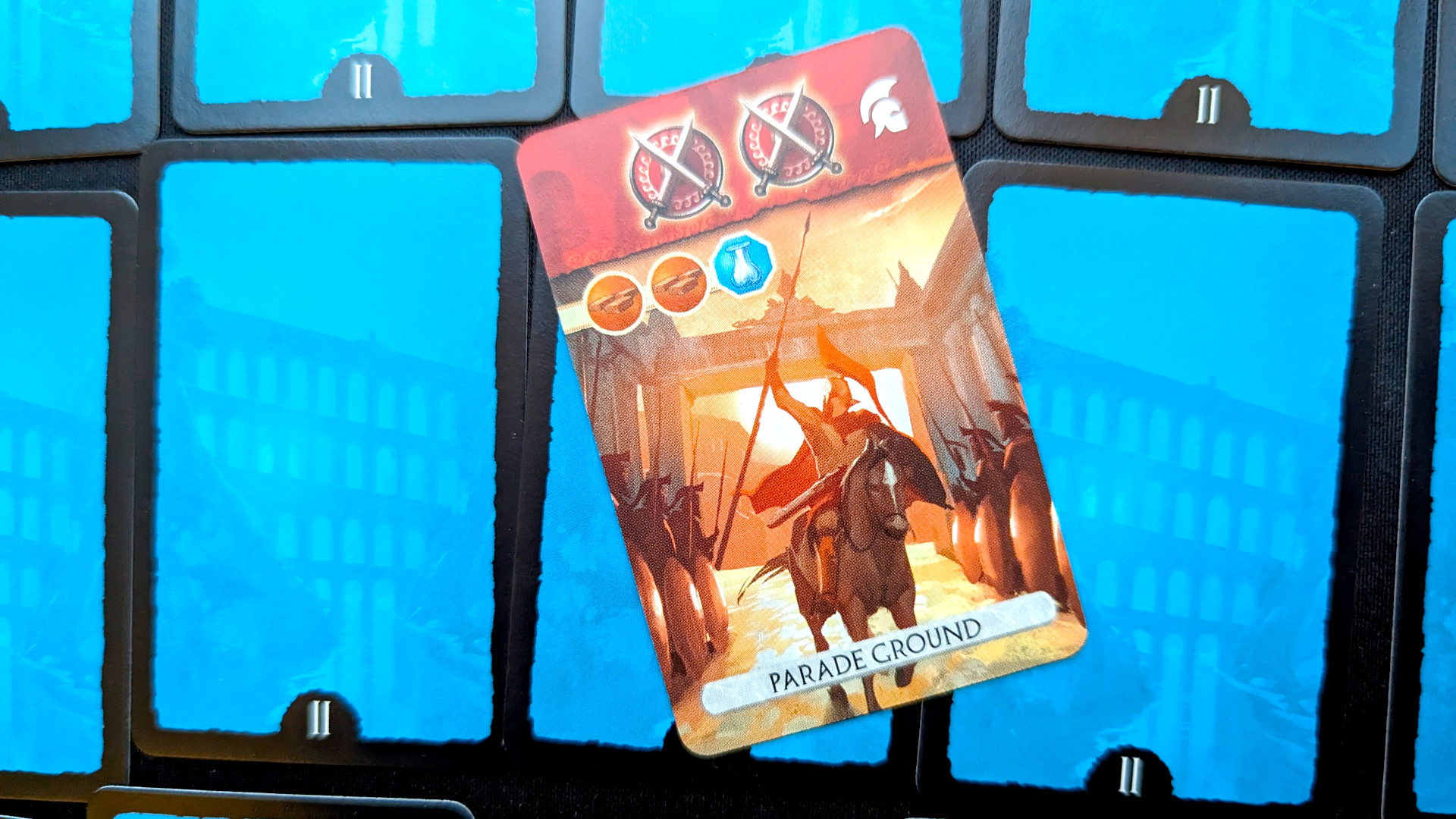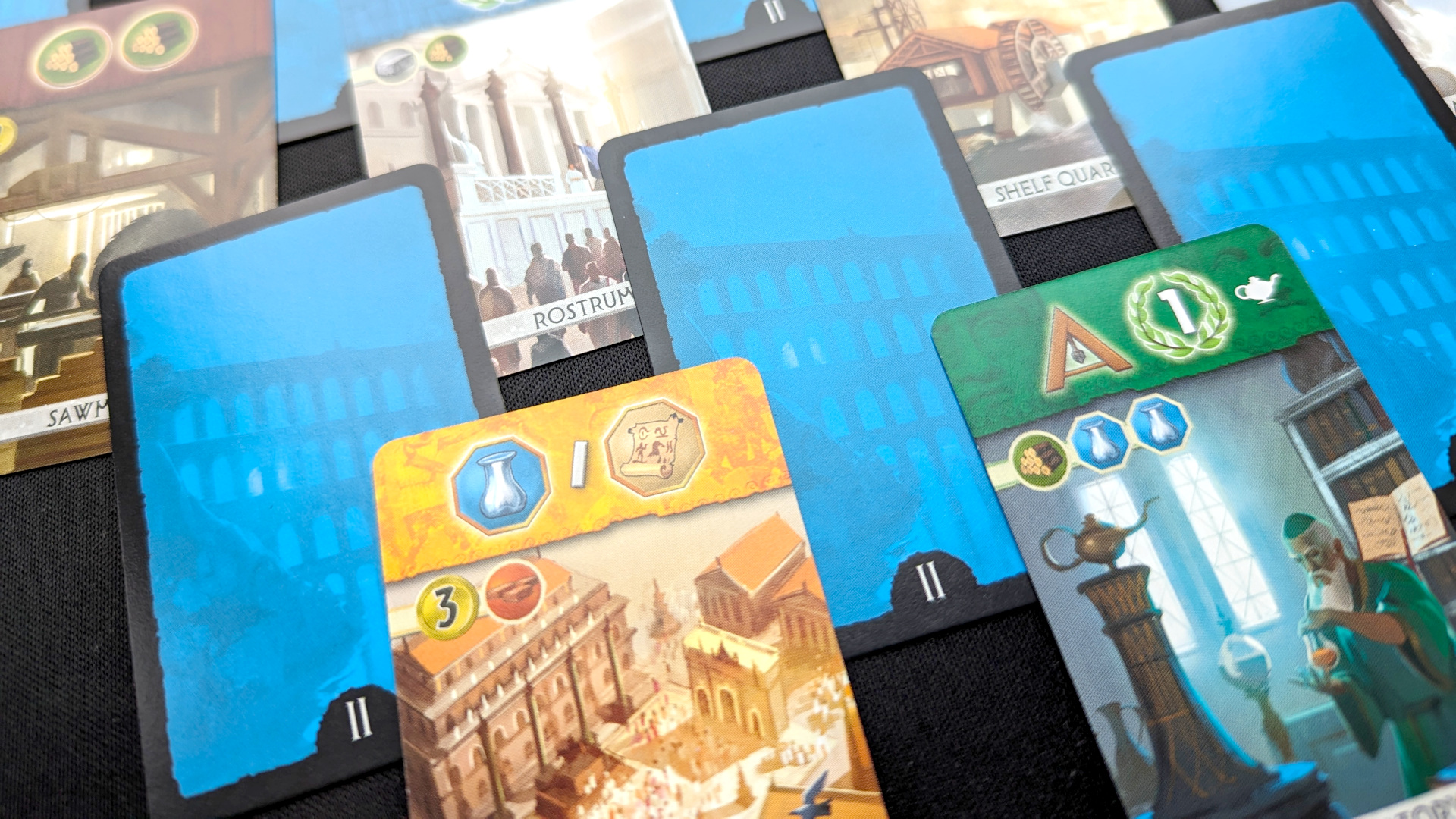Our Verdict
Fast, smart, and a doddle to teach, 7 Wonders Duel is simply one of the best two player board games around.
If there’s one thing board games make very clear about the ancient world, it’s that those toga-clad old-timers absolutely loved victory points. From the sparkling coasts of the Aegean to the muddy banks of the Nile, it seems that everyone was hungry for sweet VPs. In this regard, 7 Wonders Duel doesn’t do much to buck convention. Where it does stand out from the crowd, however, is in promising a city-building showdown that’s finely tuned for two players looking to duke it out in just 30 minutes.
In a classic theme shared by historical board games and PC 4X games alike, each game of 7 Wonders Duel sees you and your opponent competing to be the preeminent civilization in a clash of ancient city states. Across three rounds – known here as ‘ages’ – you’ll take turns selecting cards, with each one representing a building that you permanently add to your city.
Within a matter of minutes, you’ll have amassed a portfolio of properties that are pumping out stone, papyrus, and a variety of other plausibly old-sounding resources denoted by the icons on the top of each card. You’ll use this ongoing production to pay for yet more cards, giving you the basis of an engine that can propel you to victory.
Anyone who’s played Duel’s older, bigger sibling 7 Wonders – a worthy entry in our list of the best board games ever made – will recognise much of that description. But, where the full-size 7 Wonders is a drafting game that sees you pick from hands of cards passed between players, Duel opts for a different approach that’s informed by its laser focus on the two player experience.
So, at the advent of each age, you’ll take the corresponding deck of building cards and deal them out onto the table – some facedown, some faceup – in a solitaire-like ‘structure’. Each turn, you’ll select a faceup card from the bottom of the structure, paying for it with the resources produced in your city. Then, you’ll turn over any facedown cards that are now at the bottom of the structure, revealing any buildings that were obscured by the card you’ve just nabbed.
Alternatively, if there’s no card available that takes your fancy, you can select a building from the structure to discard in exchange for a handful of coins. This handy currency can be used to cover any shortfalls in resource production when you’re purchasing new cards – but the process of discarding from the structure is also an excellent way of punting valuable buildings out of the game before your opponent can claim them.
So, when you spot your rival eyeing up the glassworks their city so desperately needs, you can hurl it straight into the discard pile and collect a payday. Whether you choose to follow this up with a cackle of sadistic satisfaction is up to you, but we certainly recommend it.
This basic turn structure – in which you select a card to add to your city or discard for cash – is simple and memorable enough to teach in mere moments. But the joy of this system is that it constantly has you weighing the benefits of claiming the buildings you really want against the risks of leaving other cards available for your opponent to snatch away.
Sure, you could grab that sawmill to double your city’s lumber production, but are you really comfortable with giving your opponent the first pick of the two face-down cards you’ll have to reveal in the structure?
The multiple paths to victory add further wrinkles to your decision-making, and lend each game of 7 Wonders Duel a distinct flavor. The civilian victory is the most common way to win, and it’s awarded to the player with the most VPs displayed on cards in their city at the end of the third age.
Playing for the civilian victory, then, is all about creating an efficient engine and then using it to construct high-value buildings – such as the alluring guild cards that start to appear in the final age and offer potent multipliers when you get to final scoring.
You might also choose to invest in the titular wonders: expensive cards representing real-world architectural marvels such as the Sphinx, the Hanging Gardens, and the Temple of Artemis. Since these are distributed to players at the very beginning of the game, you’ll have ample time to decide whether it’s worth sinking effort and resources into these pricey constructions.
The rewards for doing so can certainly be tempting. As well as showers of coins and victory points, some wonders offer powerful one-time abilities, such as letting you immediately take another turn, or even allowing you to reach into your opponent’s city and trash one of their building cards. Cue more cackling.
If the standard civilian victory is the humble-yet-tasty potato in this engine-building frittata, the military supremacy and scientific supremacy victory conditions are the spice (maybe some fresh-cracked black pepper? A heaped dollop of harissa, perhaps? Your preferred frittata spice may vary).
If either of these conditions are met, your game of Duel will come to a dramatic, early end. As such, the merest suggestion that you’re instead going to pursue a science or military win can be enough to force an opponent radically out of position as they race to block you.
To claim military supremacy, you’ll have to push a counter (the ‘conflict pawn’) all the way down a track towards your opponent’s side of the table. With every red-topped military card you construct in your city, you’ll push that pawn one, two, or an eye-watering three spaces closer to your rival’s besieged city, and to victory.
But the reality is rarely so simple, and attempts to bully your enemy with military might are likely to see them mustering armies of their own. It’s a tense tug of war, but one that’s played out with sharp swords and muscular horses rather than boring old rope.
Pursuing scientific supremacy is another path to victory, albeit a more abstract and unglamorous one. Taking the science win is a matter of constructing green-topped building cards until your city is home to six different sciency-looking symbols.
At moments like these, Duel’s theming can feel a bit thinly applied. After all, there’s little sense of connection between your actions as a player and their ostensible outcomes in the game’s setting when you’re counting up compass and astrolabe symbols to check if someone’s got the instant win.
But we wouldn’t be picking at such brookable nits if Duel wasn’t so easy to recommend in almost every other regard. It’s a design that feels meaningfully tailored for two-player competition, that delivers tense and varied match-ups, and that’s easy enough to teach to almost any would-be adversary. 7 Wonders Duel is often feted as one of the best two player board games, and it’s easy to see why. So start revving up that cackle. You’re going to need it.
